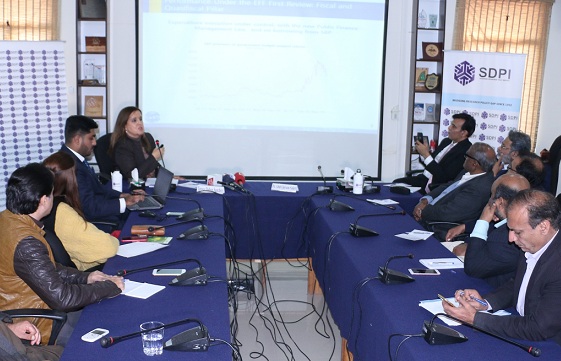IMF portray overall positive economic performance of Pakistan in first quarter review

Islamabad: International Monetary Fund’s (IMF) Resident Representative for Pakistan, Ms. Teresa Daban Sanchez on Tuesday while clarifying misunderstanding around the first review of Pakistan’s economic performance under the Extended Fund Facility (EFF) said that Pakistan’s overall macro-economic performance remained satisfactory where revenue collections have increased substantially and there is improvement in the trade deficit and net foreign assets. However, slower economic growth and failure to get out of grey-list by FATF remained major risks to the program.
She said this during a conversation with relevant stakeholders on first quarterly review of 39-month arrangement made under the EFF for Pakistan organised by the Sustainable Development Policy Institute (SDPI) here at Islamabad. Teresa Daban said that though inflation has started to stabilize but food price inflation continues to be a major concern. Owing to stabilization policies of the government, public debt, although at a high level, continues to be sustainable, she added.
Teresa Daban said that there was a successful transition towards a market-based exchange rate regime by the government which helps increase foreign exchange reserves. The government was also successful in controlling expenditures with the help of new public finance management law and avoid borrowing from the central bank. However, economic activity was softening as the economy adjusts to a new stabilisation policies, she added.
Teresa Daban while highlighting risks to the program sustainability said that slower growth could undermine the program’s fiscal consolidation strategy and opposition to institutional reforms, which may result in stagnant economic growth and hamper the population to benefit from the reforms. Moreover, failure to get out of grey-list by FATF could have implications on capital inflows to Pakistan. Owing to lack of a majority by the ruling party in the upper house, provinces may underdeliver on their surplus commitments, she added.
“The authorities’ steadfast commitment to the program and decisive policy and reform implementation could help mitigate these risks,” she said adding close monitoring, with quarterly reviews, which allow for adjustment and improvements coupled with strong support by the international community, in the form of financial assurances and continue calibration and potential scaling up of social spending can help tackle the risks and faster recovery.
Daban Sanchez said that as per Memorandum of Economic and Financial Policies (MEFP) the government is committed to strengthening the tax administration and advancing the tax policy by eliminating exemptions by the FY2021 and a joint working group on harmonization of GST (end-March 2020). Moreover, under MEFP the government will improve the governance of state-owned enterprises (SOEs) through privatization of two LNG plants by end FY2020 and published audits of PIA and PSM-Pakistan Steel Mill (end Dec 2019) coupled with new SOE legal framework and triage of SOE, both by end Sept 2020.
Regarding poverty reduction and social protection actions as envisaged in MEFP, the authorities are committed to higher spending by expanding PKR 180 billion BISP allocation and better targeting by updating the National Socio-economic Registry (NSER) (end 2020).
While responding to a question, Daban Sanchez clarifies that the IMF does not dictate economic policies of the government, instead IMF help the government in providing technical support in order to take the right decisions.
Executive Director, SDPI, Dr. Abid Qaiyum Suleri said that despite positive first quarterly performance review by the IMF, there was so much misunderstanding and negativity on our national media around the first review of the IMF. He said that the purpose of holding this conversation with relevant stakeholders was to clarify those misunderstanding and negativity around the first performance review. This program and its review will be determining the way forward and the short-term, medium-term and long-term vision of the government with regards to the economic policy making for Pakistan, he added.
Related News

ICCI, Thai embassy agree to fast-track trade, tourism and investment cooperation
B2B meetings, delegation exchanges key to brining Pakistani-Thai business communities closer: Sardar Tahir Mehmood ISLAMABAD,Read More

Massive protest planned for Dec 22 against ‘Anti-Business’ tax move
ISLAMABAD, DEC 15 /DNA/ – The business community of the federal capital has categorically rejectedRead More


Comments are Closed